Environmentally friendly ferries and small islands
Denmark is a small country with thousands of islands of which about 75 is inhabited. For us who lives here bridges and ferries have always been a large part of getting around. As we are good at building infrastructure there have been built more and more bridges. The 18 km bridge and tunnel connection over Great Belt, and the Øresund Bridge between Copenhagen and Malmö in Sweden as the largest examples.
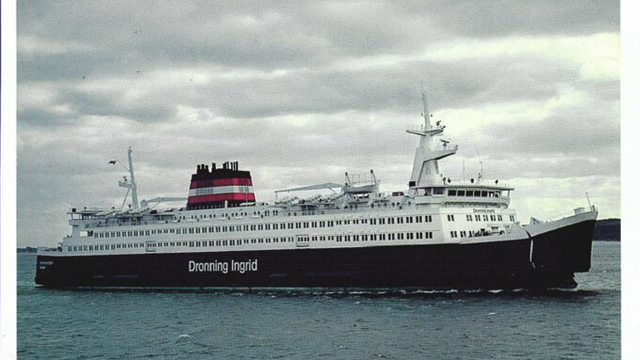
But many of the small islands still needs a ferry, and that has collided with another infrastructure effort.
In 1997 it was announced that Samsø, an island with 3500 inhabitants, was to be Denmark's first "renewable energy island". There was no money attached from the government, but through local efforts the inhabitants have succeed in changing their energy supply to electricity made from wind power and biomass. The residents of the island who had been battling with bad economy, unemployment and the young people moving away, rallied around this new project with a new found entusiasm... and they were even making money from it by exporting electricity to the second largest city in Denmark, Århus. Many other little islands have since then decided to follow Samsø and become self-sufficient in as many ways as possible. Young families are moving back to the islands to settle down in this combination of modern technological utopia and classical Danish rural idyll.

There is a problem though that only now is getting solved. If you claim to be a CO2 neutral island you should include everything - also the ferry.
Ferries are hard to electrify with the current battery technology and Samsø has opted for a gas driven ferry. Right now it is using natural gas from Holland, but Samsø is working intensively to establish a biogas plant that can produce biogas for the ferry.

But for the last four years there has been another project - an electrical ferry that should be able to travel the South Funen Island Sea. E-ferry, is a four-year innovation project with the aim of designing, building and testing a 100% electric, medium-sized ferry for passengers and cars, trucks and other cargo. The goal is to promote energy efficient, CO2 neutral and pollution-free waterborne transport on island routes and in coastal waters. An effort that might be usefull in many places in a Europe and abroad. The ferry is built in lightweight materials such as fiberglass, and the hull is shaped to be as energy efficient as possible, but it still needs to have an enormous battery-pack. The world's largest type-approved battery pack for maritime use actually.

As with all electrical vehicles the problem is the heavy batteries with relatively low Energy density (compensated with a light build of the hull), and the advantage is the high energy efficiency of the electrical motor. If a better battery type than the ion-lithium used in the e-ferry is invented, electrical propulsion will be used everywhere, but in the current circumstances there has to be made many careful design decisions to make it work on a ship like this.
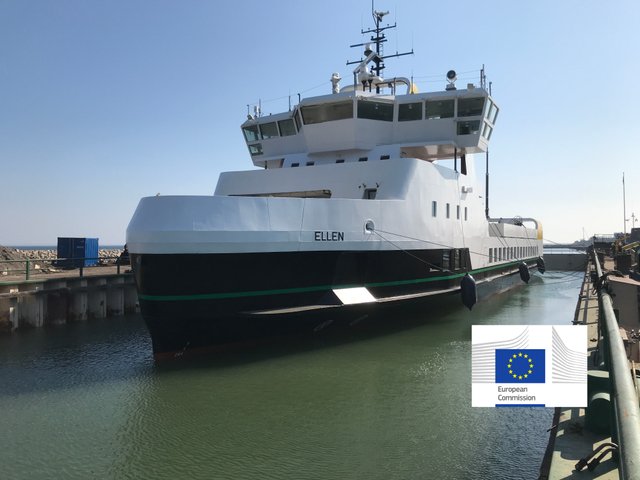
Now after 4 years development the ferry, Ellen is finally ready to be tested for real. It sailed for the first time 15th of August this year and now there will probably be some time with trial and error design. Today, after being on the sea for a month, it had to be cancelled as they had to work on some inadequacies in the control system. :) The ferry can accommodate 200 passengers and 31 passenger cars or 4 trucks and 8 passenger cars. It will be able to sail 22 nautical miles between each nightly charge in Søby with additional charge each time it docks. The range is 7 times longer than any other fully electric car ferry. Another advantage is that it is very silent and vibration free compared to conventional ferries.
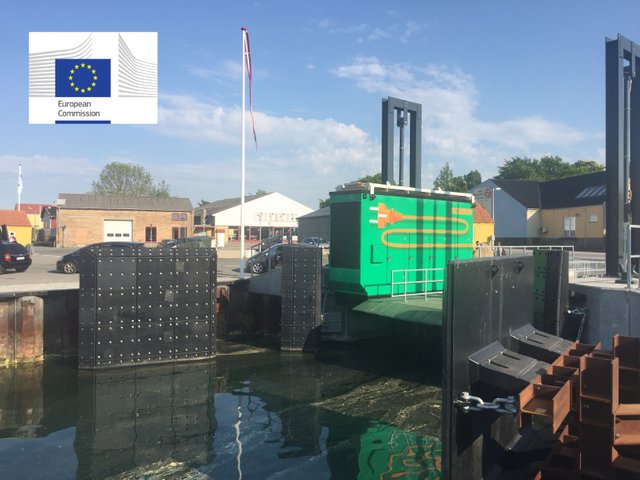
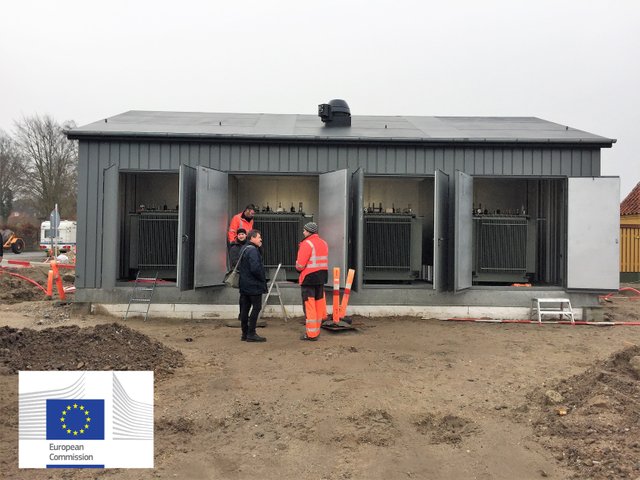
The island of Ærø, one of the smallest municipalities in Denmark, is supposed to be completely CO2 neutral in 2025. They have received help to the funding from EU, but have financed two thirds themselves and you can see from the material available how proud they are of pioneering these new technologies. Creating CO2 neutral societies have not only been a economic success, but also a cultural revival for these small communities.

This is mainly an art blog, but from time to time I write about other things like environmentally friendly efforts in Denmark (where I live), music, and sometimes It's just the sad wanker rant.

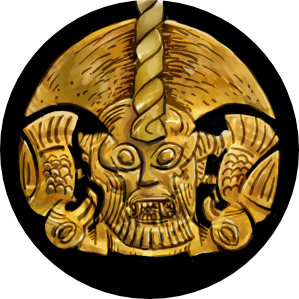
This post is manually curated by @azizbd and received an upvote from @SchoolForSDG4
School For SDG4
A School For Social and Educational Development of Underprivileged Children
For some reason, I completely missed your post. This is really a great news. Whilst we hear a lot about flights and the related pollution, nothing is said with respect to boats. I do not remember where I have read that cruise ships (okay this is not every boat) where polluting as much as airplanes. Anyways, this is probably a very good step in making boats more eco-friendly in the future!
Cruise ships are terrible in so many ways. Small Norwegian and Greenlandic fjords with 120 inhabitants are flooded with 4000 tourists. Here in Copenhagen they keep their crude oil engines on to make electricity for the ship while in harbour making tons of particle pollution. In Venice they sail into the quay and destroy the city.
Ferries are also pretty polluting (both CO2 and particle wise) as they are doing a lot of manoeuvring, backing and such. Large containerships are all in all the most energy efficient way of transport over long distance, but I would like to see much more research making that part CO2 free also.
The problem is the same: not enough money to fund research that could help solving these issues. Whilst this holds on many aspects, most people are presently getting aware of the issues so that we may hope for a change in a decade or so. If not, then it will be too late anyways... :/
Yea, speeding up the science efforts will have to be a political decision. As I wrote here the new Danish government have set a very high goal and everybody agrees that it has to be done with technology that is not yet developed, first and foremost a smart energy system that can bring the resources where they are needed in a decentralised system. We can only hope the process will speed up drastically these next ten years.
How wise it is! A good and such a rare example when politicians really work - for the people and for the future. Spending money on science, not on wars in distant corners of the world. Sorry for my being that emotional, but environmental matters mean quite a lot to me. In Russia, we've got so many issues...
I am pretty emotional about it too. I am only glad to hear that people elsewhere care.
Wow! I was not imagining Denmark being so much on the forefront! Thanks for the link!
It is fairly resent. Libertarian governments supported by national-conservatives have slowed down the tempo a lot, but now the bar have been raised for some higher ambition and a recent poll showed 70% support among the Danish voters, so I am sure this project will be completed. No one knows exactly how the last 10% of the 70% shall be accomplished, but a smart energy system that connects the already decentralised heat and electricity systems is probably the main key, and then the whole traffic has to be changed like I wrote about in post about electric cars. The latter will most likely be the hardest part for most people.
Thanks for the precisions. I am looking forward to the success of this, as an example for other countries. I am really ashamed by what France does... or actually doesn't do. I am no French (so that I have no power at the elections at all), but I leave here for so many years... And I am sad...
This post has been voted on by the SteemSTEM curation team and voting trail. It is elligible for support from @curie.
If you appreciate the work we are doing, then consider supporting our witness stem.witness. Additional witness support to the curie witness would be appreciated as well.
For additional information please join us on the SteemSTEM discord and to get to know the rest of the community!
Please consider setting @steemstem as a beneficiary to your post to get a stronger support.
Please consider using the steemstem.io app to get a stronger support.
This post is about more than environmentally friendly ferries. It's also about keeping the countryside alive and the cities from being overcrowded and the cost of living in them from going through the roof.
True! It has been a very special thing to follow these stout people turn things around. One of the things that actually should be possible with all the new technology is to live whereever you want. Sadly it has been going towards more and more mega cities, but something like this could make a change.
The coop thing has alwasy been very big in Denmark and it is one of the things necessary to do it the right way. Big business is going in for the kill everywhere and then the windmills and sun panels will not benefit the locals.
This post was shared in the Curation Collective Discord community for curators, and upvoted and resteemed by the @c-squared community account after manual review.
@c-squared runs a community witness. Please consider using one of your witness votes on us here
Congratulations, Your Post Has Been Added To The Steemit Worldmap!
Author link: http://steemitworldmap.com?author=katharsisdrill
Post link: http://steemitworldmap.com?post=environmentally-friendly-ferries-and-small-islands
Want to have your post on the map too?
Congratulations!
Join us on Discord






A Youth Run Community Organization from Bangladesh
50SP100SP200SP500SP1000SP2000SP5000SP10000SP
Hiya, @LivingUKTaiwan here, just swinging by to let you know that this post made into our Honorable Mentions in Daily Travel Digest #621.

Your post has been manually curated by the @steemitworldmap team. If you like what we're doing, please drop by to check out all the rest of today's great posts and consider upvoting and supporting us.
Wow, I am looking forward to reading more articles like this.